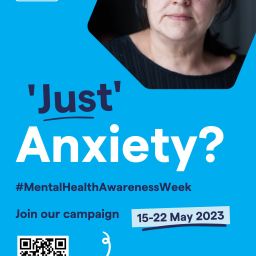 May is National Teen Self-Esteem Month. Self-esteem affects people of all ages, but it is especially crucial to instill positive self-worth in young people from an early age. Poor self-image can lead to a lifetime of negative consequences, impacting all areas of life, including behaviour, enjoyment of life, goals, aspirations, and relationships. As we emerge from the pandemic, it is vital to facilitate the growth of self-esteem in young people in any way that we can – in the home, school, and local community.
May is National Teen Self-Esteem Month. Self-esteem affects people of all ages, but it is especially crucial to instill positive self-worth in young people from an early age. Poor self-image can lead to a lifetime of negative consequences, impacting all areas of life, including behaviour, enjoyment of life, goals, aspirations, and relationships. As we emerge from the pandemic, it is vital to facilitate the growth of self-esteem in young people in any way that we can – in the home, school, and local community.
The pandemic has significantly impacted the general well-being of young people within the UK. The Prince’s Trust NatWest Youth Index 2022 reported that levels of happiness and confidence in 16-25-year-olds hit their lowest point during the last thirteen years. The pandemic has taken a toll on everyone’s mental health, but it has been especially challenging for teenagers. There are so many changes going on in their lives – physical, hormonal, emotional – along with the pressures of social and relationship issues, peer pressure, and increased academic expectations.
Parents can often unknowingly add to the overwhelm by piling on their own set of standards their teen must meet. Teens are constantly bombarded with impossible societal standards by the media. We often forget what it feels like to be a teenager, but it is crucial to remember the challenges they face and help them build their self-esteem.
There are several contributing factors to the decrease in self-esteem amongst teenagers. The teenage years are a crucial developmental stage, and teenagers become increasingly attached to their friends and peers. However, this interaction has been stunted hugely by the pandemic and recurring lockdowns. Young people have had to rely almost solely on social media to connect with their peers, leading to intense feelings of comparison, anxiety, and in some cases, negative experiences involving trolling. A new study has revealed that the reduction in self-esteem that girls experience in their teen years can be partially explained by social media. This suggests that the potential negative impact of social media on teenage girls’ self-esteem may have a more long-lasting impact than one might think.
Along with social factors, academic pressure weighs heavily on our young people, now more than ever. Heavy workload, exams, and schoolyard bullying may all contribute to the deterioration of young people’s mental health. With many schools, parents, and other sources pushing the idea of going to University, achievement, and academic excellence, some of our young people are facing burnout-like symptoms while still at school. In a world that asks so much of our young people, it’s crucial that we encourage them to do their best without compromising their mental health.
So how can we help improve the self-esteem of our young people?
Encourage strong friendships across all generations and communities
At such an important stage of development in which there is a huge reliance on building and maintaining friendships, some young people have concerns about their ability to socially interact and experience ‘belonging’ within their peer groups. Now that social restrictions from the pandemic have eased, there is a great opportunity to encourage activities that get young people socialising, and in turn, developing flourishing relationships. Friends are a huge source of encouragement, support, and fun – exactly what young people need right now!
These friendships don’t have to be with others of the same age. Bonding with other people in the community, older or younger, in a setting they feel comfortable with is hugely beneficial. By getting to know the elderly, young people learn from their experiences, wisdom and are encouraged to help those in need in their community. By meeting those younger, through babysitting, mentoring schemes, or through family friends, they learn responsibility, mentorship, and leadership skills. Meeting a mix of people from different backgrounds can help teens understand and appreciate difference, affirming that it’s okay for them to be different too. This can in turn help them feel confident in themselves and their abilities.
Encourage self-care practices
Self-care practices are vital to maintaining good mental health and developing positive self-esteem. Encourage young people to take time for themselves and engage in activities that make them feel good. This could be anything from taking a walk, practicing mindfulness, or engaging in a hobby they enjoy. By incorporating self-care into their daily routine, young people can learn to prioritise their own well-being and develop a positive self-image.
Teach media literacy
Social media and other forms of media can have a significant impact on the self-esteem of young people. It’s important to teach media literacy so that young people can identify unrealistic beauty standards and other harmful messages portrayed in the media. By teaching young people to critically analyse media messages, they can learn to see beyond the surface and recognise the underlying messages.
Seek professional support
In some cases, young people may need professional support to address issues with self-esteem. This could involve therapy, counseling, or other forms of support. It’s important for parents, teachers, and other caregivers to be aware of the signs of poor self-esteem and to seek professional support when needed. By addressing issues with self-esteem early on, young people can develop healthy self-image and thrive in all areas of their lives.
Hypnotherapy is fast, effective and non-invasive. Many hypnotherapy practitioners work in future focused, solution oriented approaches meaning that there’s no need to spend lots of time talking about what’s going wrong and focusing on the difficult things in life. Working with a hypnotherapist may help you feel more confident and more at ease about things which have previously been challenging for you says the National Council for Hypnotherapy. A qualified clinical hypnotherapist can assist teens in growing their self-esteem, and change their relationship to their anxious thoughts and feelings helping them navigate the world more confidently.
Click here to access the NCH directory, with over 3,000 therapists all around the UK there’s sure to be caring, effectively support close to hand.














